FTSE Fights Back To Climb Out Of Bear Market

The FTSE 100 has fought back strongly after sinking to its lowest levels since July 2012 - helped by an improving oil price, the US economy, and reassurance over the banking sector.
London's leading share index finished 3.1%, or 170.6 points higher, more than wiping out the steep losses seen in the previous session.
It was the biggest one-day percentage gain in more than five months and took the FTSE 100 Index out of so-called "bear market" territory - jargon to describe when a market has fallen by a fifth from its most recent peak.
Germany's Dax and France's Cac 40 rose by 2.4% and 2.5% while Wall Street was also well ahead at the time of the close in London.
The UK market charged ahead on strong gains from mining and banking stocks.
There were also strong gains for Rolls-Royce.
Despite the engine maker announcing a cut to its dividend , it saw its share price jump 14% as investors cheered the move by the beleaguered company to strengthen its finances.
Wider sentiment was lifted by an improvement in the oil price, with a barrel of Brent crude reaching about $33 during the session.
BP climbed 7% and Royal Dutch Shell was up by nearly 6%
Banks were also doing better after a tough period which has seen their values plummet.
Standard Chartered (BSE: 580001.BO - news) climbed 11% while Barclays (LSE: BARC.L - news) gained 6%.
In Germany, shares in Deutsche Bank (Other OTC: DBAGF - news) rocketed by 12% after it announced a programme to buy back about £3.7bn-worth of its own bonds - parcels of debt that have been at the centre of market worries over the lender in recent days.
There was further cheer as US retail sales posted modest gains for January, showing that Americans kept shopping despite global financial turbulence which it has been feared could feed into the world's biggest economy.
In London, the index of the UK's 100 largest listed companies has shed around 9% of its value so far this year.
Global markets have seen renewed turmoil this week amid heightened concerns over the state of the world economy - with US Federal Reserve chair Janet Yellen on Wednesday admitting evidence of greater risks, despite the Fed raising US interest rates in December citing a rosy outlook.
Other central banks - including the European Central Bank and the Bank of Japan - have been cutting rates to try to stoke economic activity.
Markets are jittery about the gloomy outlook that has prompted this action and fearful that, with many countries already having zero or negative rates, they have few tools left in their armoury to respond to another downturn.
Many also argue that negative interest rates hurt banks' profitability.
Markets are also mindful of the impact of oil.
Although the Bank of England says that lower prices are good for the UK economy as a whole, the firms that fund pensions are often heavily exposed to the value of "black gold" which has collapsed from a peak of more than $115 in the summer of 2014.

 Yahoo News
Yahoo News 